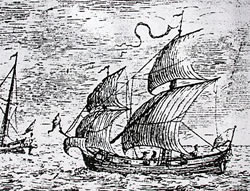Using the Archives Hub
Archives bring history to life, they teach, inform and inspire, they help shape national, communal and individual identity and they provide a rich resource for unique research.
An Introduction to the Archives Hub (20 m. presentation on YouTube).
Find out more
If you are new to archives:
Using Archives: A Guide for the Inexperienced

Sail forth with out simple guide to introduce archives, giving you information on finding archives, visiting repositories, working with archives and how to read archive descriptions
Find out more about why researchers value the Archives Hub.
What sort of archives are on the Hub?
Does the Hub exclude any archives?
What are Archives?
Archives - in the sense that they are represented on the Archives Hub - are unique collections of material, created during the course of a person's life or day-to-day activities, or as part of a business or other activity, and considered worth preserving permanently for future research.
See 'What Are Archives' in our Guide to Using Archives.
Why use the Archives Hub?
The Archives Hub has been described as "An incredible resource for the researcher looking for materials relevant to their subject."
- The unique resources we describe can be invaluable for your research, adding depth and evidence, and giving you the chance to uncover new knowledge and make new connections.
- You can search across thousands of descriptions of archive collections held in over 300 UK archive repositories
- You can locate all relevant sources for a research topic and bring them together intellectually in order to get a good sense of what is available, and how separate collections may relate to each other.
- The Hub can save a huge amount of time compared to searching the individual websites of repositories.
- You can uncover unexpected sources held in unlikely places
- Many collections are only described on the Archives Hub
What sort of archives are on the Hub?
- The Hub includes descriptions of research papers, correspondence, diaries, log books, photographs, sketches, business records, minutes, annotated books, cuttings and ephemera. It also includes digital archives, and often links to images and other digital content.
- Types of archives which you can discover include
- the archives of people, such as writers, scientists, artists, and politicians.
- the archives of corporate and institutional bodies such as banks, breweries, universities, manufacturers and theatres.
- the archives of groups and societies such as charities, pressure groups and religious groups.
- the archives of events, such as theatre performances, conferences, exhibitions and expeditions
Does the Hub exclude any archives?
- The Archives Hub does not really represent datasets, such as economic and social datasets created through surveys. These sort of data sets may be found through the UK Data Archive.
- We have some local authority archives, particularly from Wales, but we do not focus on things like family estate papers and parish registers.
- The descriptions we have are those that our contributors choose to provide, but not all of them have all of their holdings described.
Searching Tips
Get started by simply typing a word or phrase in the search box. Use the filter options to narrow down your search if appropriate.
It is really important to try different search terms, as otherwise you may miss significant collections. Think of search strategies - think in terms of different search terms, and combinations of search terms, that represent your subject area. If you are looking for archives about a person or organisation think about the terms associated with them, the places that may be relevant, other people they worked with. You may have to come at your research from a number of angles.
Searching by title, creator, name or subject can be more specific, but bear in mind that your search term - e.g. personal name = john ruskin, subject = russian literature - may not be included as a title or subject but may be a word or phrase within a description.
Searching Examples
Russian literature - try various names, such as Nabokov or Tolstoi, and try 'russia' and 'writers'. You can use 'russia*' for both Russia and Russian. Thesauri are likely to include 'literature' as a subject term but may not include 'russian literature', so use 'literature' as the subject and add 'russia' as a keyword.
Child welfare - try 'childhood', 'child health' and 'child care' and you could also try 'adolescents' or 'health policy' or 'children' and 'care'. If you search for 'child labour' you might also want to try 'child labor' or 'child lab*r' (sometimes American spelling is used for subjects). Remember that collections may not have been catalogued with the subject that you choose. For example, the Unesco thesaurus of subjects does not include 'child health' but it does include 'child welfare'.
Womens Rights - try 'suffrage', 'womens organisations', 'gender' and 'discrimination', social inequality' and so on. The Unesco thesaurus, which is commonly used as a source of subjects, does not include 'suffrage' as a subject, but does include 'womens rights' and 'gender discrimination'. You could also try the subject of 'elections' and then search for women.
Join our mailing list
Our monthly bulletins provide you with updates about new collections on the Archives Hub and tips for using archives in your research. Sign up to our mailing list.
"I use the Archives Hub to get a sense of what is available for my research. It is critical in helping me to use my time most efficiently. Being able to evaluate archives online allows me to do in-depth historical research." Lecturer, Loughborough University
"I value the extensive coverage - sometimes I just need to know what sort of material is already out there (rather than detailed descriptions) and I feel I can rely on the Archives Hub." Postgraduate researcher

